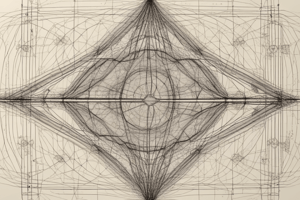Podcast
Questions and Answers
Which type of number can be expressed as the quotient of two integers?
Which type of number can be expressed as the quotient of two integers?
- Irrational numbers
- Whole numbers
- Natural numbers
- Rational numbers (correct)
Which of the following is an example of an irrational number?
Which of the following is an example of an irrational number?
- √2 (correct)
- 5/9
- 3
- 0.25
What type of number serves as the basis for whole numbers?
What type of number serves as the basis for whole numbers?
- Irrational numbers
- Rational numbers
- Natural numbers (correct)
- Integers
Which number system includes both positive and negative numbers but not fractions?
Which number system includes both positive and negative numbers but not fractions?
What distinguishes irrational numbers from rational numbers in terms of decimal expansions?
What distinguishes irrational numbers from rational numbers in terms of decimal expansions?
Which of the following number systems does NOT include negative values?
Which of the following number systems does NOT include negative values?
Which number system is essential for describing quantities that can be measured or counted?
Which number system is essential for describing quantities that can be measured or counted?
Which type of number is -3 in the number system described?
Which type of number is -3 in the number system described?
What type of numbers can be expressed as fractions in the discussed systems?
What type of numbers can be expressed as fractions in the discussed systems?
Which number system includes all natural numbers, their negatives, and zero?
Which number system includes all natural numbers, their negatives, and zero?
Flashcards are hidden until you start studying
Study Notes
Exploring Number Systems
Number systems are fundamental to our daily lives, enabling us to measure, count, and communicate in a wide variety of contexts. Let's delve into the world of numbers, starting with the most basic and fundamental systems and progressing to more advanced constructs.
Natural Numbers
Natural numbers, also known as counting numbers, consist of 1, 2, 3, and so on. They are the simplest numbers and form the foundation for all other number systems. Natural numbers are used for counting objects and determining order. For example, we might say "There are five people in the room."
Whole Numbers
Whole numbers include natural numbers and zero. These can be represented as 0, 1, 2, 3, and so on. Whole numbers are essential for describing quantities that can be measured or counted, such as the number of apples in a basket or the amount of money in a bank account.
Integers
Integers are whole numbers extended to include their opposite values, such as -2, 3, 0, and so on. This system enables us to represent both positive and negative quantities, making it possible to describe differences, such as the number of apples taken away from a basket or the temperature difference between two locations.
Rational Numbers
Rational numbers can be expressed as the quotient of two integers, such as 1/2, 3/4, and -11/5. They include both integers and fractions. Rational numbers are essential for performing calculations and making measurements, such as finding the cost of a pizza slice or determining the length of a piece of wood.
Rational numbers can also be represented as terminating or repeating decimal expansions, such as 1/3 as 0.333... or 2/11 as 0.18181818....
Irrational Numbers
Irrational numbers are real numbers that cannot be expressed as the quotient of two integers. Examples of irrational numbers include π (pi), the square root of 2 (√2), and the golden ratio (φ). Irrational numbers are essential for describing measurements that cannot be represented as exact fractions, such as the circumference of a circle or the diagonal length of a square.
Irrational numbers can also be represented as non-terminating and non-repeating decimal expansions, such as π as 3.141592653589793...
These number systems are interconnected, and each builds upon the previous one. Natural numbers form the basis for whole numbers, which in turn form the basis for integers. Rational and irrational numbers expand our understanding of quantities and enable us to represent more complex and precise measurements.
Understanding these number systems is essential for mastering essential math concepts and applying them to real-world contexts. As you continue your journey in mathematics, keep the following number systems in mind and explore their interconnections, properties, and applications.
[Markdown]
Studying That Suits You
Use AI to generate personalized quizzes and flashcards to suit your learning preferences.




